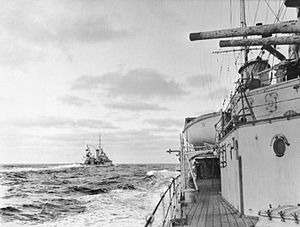Battle of the River Plate
| Battle of the River Plate | |||||||
|---|---|---|---|---|---|---|---|
| Part of the American Theatre of Second World War | |||||||
 December 1939, HMS Achilles as seen from HMS Ajax during the Battle of the River Plate. Note the charred paint on the gun barrels. |
|||||||
|
|||||||
| Belligerents | |||||||
|
|
|
||||||
| Commanders and leaders | |||||||
|
|
|
||||||
| Strength | |||||||
| One Panzerschiff (heavy cruiser) with 11 inch (280mm) guns | One heavy cruiser with 8 inch guns 2 light cruisers with 6 inch guns |
||||||
| Casualties and losses | |||||||
| One Panzerschiff scuttled 36 dead 60 wounded |
One heavy cruiser badly damaged two light cruisers damaged 72 dead (Achilles 4, Ajax 7, Exeter 61) 28 wounded |
||||||
The Battle of the River Plate was the first naval battle in the Second World War and the first one of the Battle of the Atlantic in South American waters. The German cruiser Admiral Graf Spee had been located in the South Atlantic a long time before the war began, and had been commerce raiding after the war began in September 1939. One of the hunting groups sent by the British Admiralty to search for Graf Spee, comprising three Royal Navy cruisers, HMS Exeter, Ajax and Achilles (the last from the New Zealand Division), found and engaged their quarry off the estuary of the River Plate close to the coast of Uruguay in South America.
In the ensuing battle, Exeter was severely damaged and forced to retire; Ajax and Achilles suffered moderate damage. The damage to Graf Spee, although not extensive, was critical; her fuel system was crippled. Ajax and Achilles shadowed the German ship until she entered the port of Montevideo, the capital city of neutral Uruguay, to effect urgent repairs. After Graf Spee's captain Hans Langsdorff was told that his stay could not be extended beyond 72 hours, he scuttled his damaged ship rather than face the overwhelmingly superior force that the British had led him to believe was awaiting his departure.
Admiral Graf Spee had been at sea at the start of the Second World War in September 1939, and had sunk several merchantmen in the Indian Ocean and South Atlantic Ocean without loss of life, due to her captain's policy of taking all crews on board before sinking the victim.
...
Wikipedia
